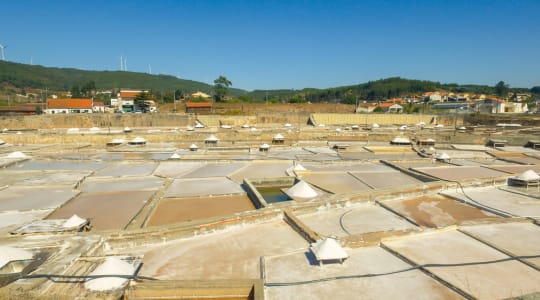
Salinas de Rio Maior is an intriguing salt production site located near the town of Rio Maior, in the Leiria District of Portugal. This unique and historic salt pan has been in operation for centuries and is one of the oldest and most traditional salt production sites in Portugal, dating back to the Roman times. Salinas de Rio Maior is renowned for its fascinating salt pans, where salt is extracted from underground saline waters using traditional methods and techniques that have been passed down through generations of salt workers.
The Salinas de Rio Maior covers an extensive area of approximately 88 hectares (217 acres) and consists of a series of shallow salt pans, interconnected channels, and wooden water wheels, which are used to transport and distribute the saline waters across the salt pans. The saline waters are pumped from underground aquifers and directed into the salt pans, where they are left to evaporate under the sun and wind, leaving behind crystallized salt that is then harvested by hand using traditional wooden rakes and tools.
One of the highlights of Salinas de Rio Maior is the traditional salt harvesting process, which is carried out by skilled salt workers known as "salineiros." The salineiros carefully monitor the evaporation process, turning the salt crystals with their wooden rakes and carefully harvesting the crystallized salt when it reaches the desired size and quality. The salt is then collected, washed, and stored in traditional wooden huts or salt warehouses, where it is packaged and sold to local markets, restaurants, and gourmet shops as a high-quality, artisanal product.
Visitors to Salinas de Rio Maior can explore the salt pans, learn about the traditional salt production methods, and watch the salineiros at work during guided tours and educational visits organized by the local salt producers' association. The site also features a salt museum, where visitors can discover the history and cultural heritage of salt production in the region, explore interactive exhibits, and learn about the geological formation of the salt deposits and the ecological importance of the saline ecosystems.
Explore Near Salinas de Rio Maior
Discover 5 attractions, 5 cities, and 1 airport within 75km. Perfect for planning day trips, finding connecting flights, or discovering new destinations to explore during your visit.
Nearby Attractions & Places to Visit
5 destinations within 18.4km - 34.2km from your location





Nearby Cities Worth Exploring
5 destinations within 22.6km - 72.4km from your location
Airports Near Salinas de Rio Maior
1 destination within 67.1km from your location
Cross-Border Adventures Near Salinas de Rio Maior
Discover cross-border adventures near Salinas de Rio Maior. Explore neighboring countries with similar attractions and extend your travel experience across borders.
